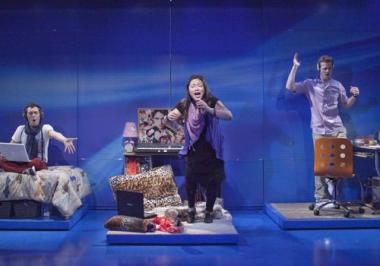During the intermission of Dividing the Estate, my companion said, "Does this take place in the '50s?"
No, it's 1987, but the small Texas town it's set in seems frozen in time, and Horton Foote's script feels like it was written 50 years ago. In fact, it's 20 years old, though this season's successful Broadway production—now transferred almost intact to Hartford Stage—was its first New York appearance. Its depiction of a family squabbling over an inheritance (even though the testator is still alive) harks back to mid-century American drawing-room dramas.
If Dividing the Estate is yesterday's news, Speech & Debate, now playing at Hartford's TheaterWorks, is as fresh as tomorrow. It follows three high school misfits who find their niche, and their power, in the school's uncoolest club. It's about being gay, about being young in today's cyberworld, about identity and morality and risk, and about 10 laughs a minute. It was a New York hit two seasons ago—not on Broadway, this one, but in the 62-seat Roundabout Underground—and it has landed in Hartford with a bang.
Both these shows, in quite different ways, are about longing. While the three teens in Speech & Debate are longing for recognition and acceptance, the grown-up children and elders in Dividing the Estate are yearning for a simpler past and/or a more prosperous future. The play is downright Chekhovian in its depiction of an old-money family clinging to its property and illusions as the economy collapses and strip malls encroach on the old estate. There's the fierce matriarch (Lois Smith), determined not to break up the property despite fiscal and familial pressures; a kind of Uncle Vanya figure (Devon Abner), who stolidly manages the plantation; even an ancient retainer (the marvelous Arthur French), a sweet, garrulous 92-year-old with shaky hands and shakier memory.
Chekhov called his bleak family albums "comedies," but Foote's version is actually funny. Its laugh lines take the edge off the family wrangle over who gets the estate and when, and even leaven the play's two deaths. But it's not funny that for the second time this season (the first was To Kill a Mockingbird), Hartford Stage is presenting a play about Southern white people in which the few black characters are little more than plot points and sympathetic background figures.
The New York critics praised this play for its comic turns and sharp insights. But I was distracted from those virtues by the script's tortuous exposition and clunky transitions, and by director Michael Wilson's awkward staging on Jeff Cowie's high, wide and shallow set. Broadway also loved Hallie Foote's Tony-nominated performance as the most graspingly insistent of the prospective heirs. She does use her Texas twang to good effect, but I could only see an actress moving through her role one premeditated step at a time.
The most encouraging thing about this production is its audaciously large cast of 14—a glorious gesture in these belt-tightening times. In that ensemble, the standout for me is Gerald McRaney (remember Major Dad?), who manages to make his character the most sympathetic of the lot, despite being an alcoholic compulsive gambler who is dating a teenager—a stroke of whimsy on the playwright's part that leads to the play's protracted and utterly silly ending.
Misfitting In
Speech & Debate lives in the realm of contemporary cyberculture. Its characters blog, text, IM, webcast and troll for dates, communicating through their computers because each of them is isolated and friendless. Howie is new in town, an out gay in a conservative community. Diwata, whose audition for the school play included a striptease, wonders why she didn't get cast. Solomon hides his uptightness by adopting the role of investigative journalist out to expose the sexual hypocrisy of right-wing politicians—and of one of his school's teachers, who comes on to Howie in a gay chatroom.
Stephen Karam is a Gen Y playwright with a keen eye and pitch-perfect ear for 21st-century adolescence. His play is LOL funny, but it also has real things to say about identity, community, self-presentation and self-preservation. At first, his three teens come together uneasily in real space, each with a different reason for wanting to expose the teacher and for agreeing to join the school's otherwise vacant Speech and Debate club.
Under Henry Wishcamper's fluid direction, the young cast is perfect. Carl Holder's Howie is wry and knowing, flaunting his sexuality while keeping a wary edge. Ben Diskant is squirmingly dorky as Solomon. A clean-cut straight arrow who's not so sure about the straight part, intense to the point of obsession, he's a self-described "pro-life Democrat."
"In other words, fucked up," says Diwata. She's the outrageous heart of this misfit trio, an "odd and frumpy" girl of ambivalent ethnicity, with an outsize opinion of her talent, zero reticence, no friends ("They're all older and most of them moved away," she lies) and a unique aesthetic: she's writing a musical version of The Crucible which somehow features a young, gay Abe Lincoln. In her professional debut, Jee Young Han just about steals the show. She's a fearless comedienne who totally inhabits this strange, annoying and utterly captivating girl.
Eva Kaminsky performs, with distinction, both the play's adult roles, an exasperated teacher who can't make Solomon understand why he isn't allowed to publish an exposé of the town's gay-bashing but closeted mayor, and a howlingly full-of-herself reporter from the local NPR station.
I'm much closer in age and life experience to the people in Dividing the Estate, but I had a much better time hanging out with the oddball teens at TheaterWorks.
Speech & Debate: TheaterWorks, 233 Pearl Street, Hartford, through July 26, 860-527-7838.
Dividing the Estate: Hartford Stage, 50 Church St., Hartford, 860-527-5151, www.hartfordstage.org.



